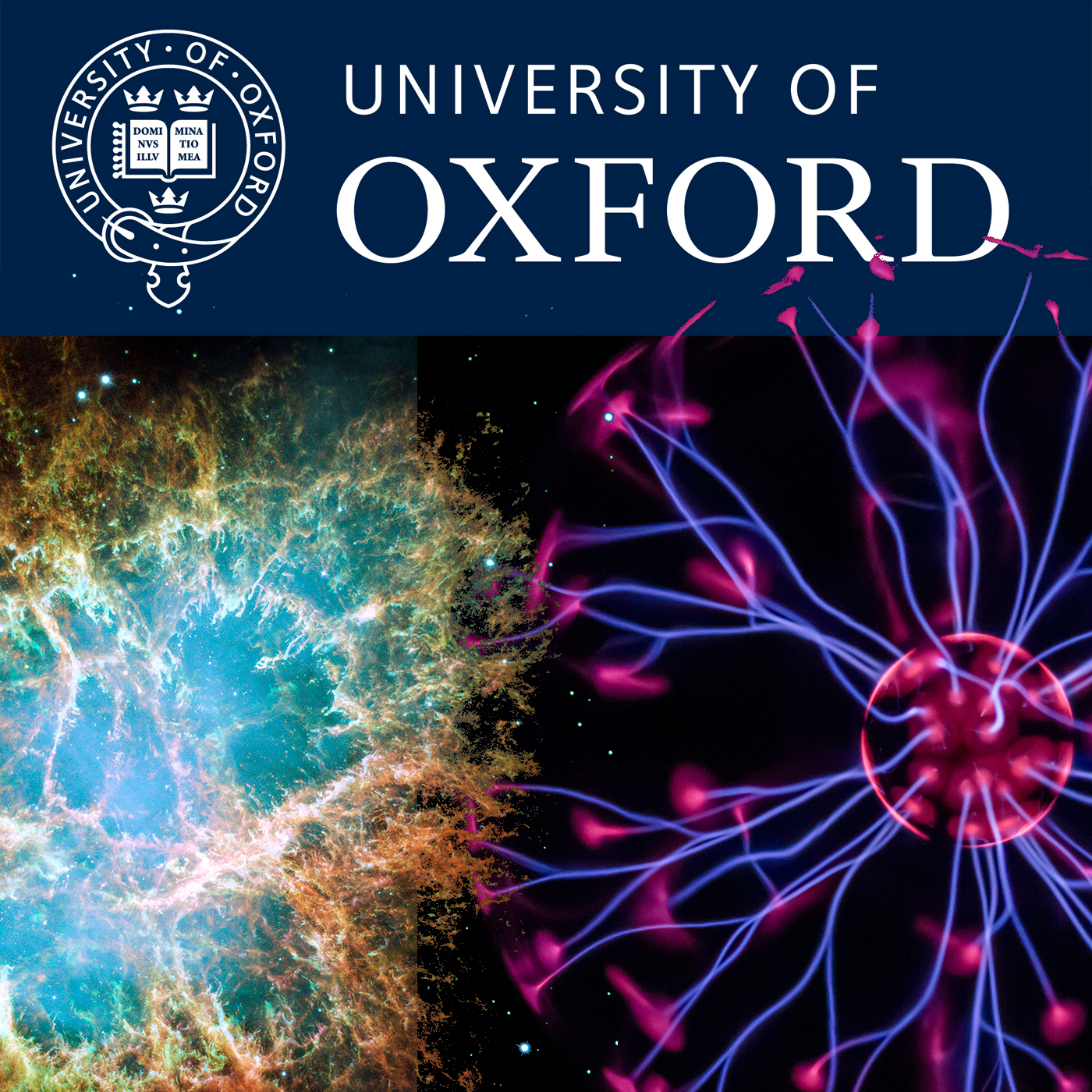

Theoretical Physics - From Outer Space to Plasma
Oxford University
Learn about quantum mechanics, black holes, dark matter, plasma, particle accelerators, the Large Hadron Collider and other key Theoretical Physics topics. The Rudolf Peierls Centre for Theoretical Physics holds morning sessions consisting of three talks, pitched to explain an area of our research to an audience familiar with physics at about second-year undergraduate level.
Episodes
Mentioned books

May 16, 2019 • 36min
From protons to collisions…
We learn about the Higgs Boson and its interactions at the LHC by examining the debris produced by colliding protons head-on at unprecedented high energies. However, we know from our theory of strong interactions - quantum chromodynamics (QCD) - that protons themselves are highly complex bound states of more fundamental 'quarks', held together by the force carriers of QCD, the 'gluons'. The question is then: how do we go from the collision of these complicated protons to a theoretical prediction that we can use to test the properties of the Higgs boson itself? In this talk, I will discuss what we know about the proton, and how we apply this to LHC collisions and our understanding of the Higgs sector.

May 16, 2019 • 45min
What the Large Hadron Collider is telling us about the Higgs sector and its new interactions
Over the past two years, CERN’s Large Hadron Collider (LHC) has started to directly probe a qualitatively new class of interactions, associated with the Higgs boson. These interactions, called Yukawa interactions, are unlike any other interaction that we have probed at the quantum level before.
In particular, unlike the electromagnetic, weak and strong forces, they have an interaction strength that does not come in multiples of some underlying unit charge. Yukawa interactions are believed to be of fundamental importance to the world as we know it, hypothesised, for example, to be responsible for the stability of the proton, and so the universe and life as we know it.

Feb 15, 2019 • 39min
Why the world is simple - Prof Ard Louis
The coding theorem from algorithmic information theory (AIT) - which should be much more widely taught in Physics! - suggests that many processes in nature may be highly biased towards simple outputs. Here simple means highly compressible, or more formally, outputs with relatively lower Kolmogorov complexity. I will explore applications to biological evolution, where the coding theorem implies an exponential bias towards outcomes with higher symmetry, and to deep learning neural networks, where the coding theorem predicts an Occam's razor like bias that may explain why these highly overparamterised systems work so well.

Feb 15, 2019 • 39min
Topology in Biology - Prof Julia Yeomans FRS
Active systems, from cells and bacteria to flocks of birds, harvest chemical energy which they use to move and to control the complex processes needed for life. A goal of biophysicists is to construct new physical theories to understand these living systems, which operate far from equilibrium. Topological defects are key to the behaviour of certain dense active systems and, surprisingly, there is increasing evidence that they may play a role in the biological functioning of bacterial and epithelial cells.

Feb 15, 2019 • 14min
Welcome from the Head of the Physics Department
Ian Shipsey delivers the welcome speech for the Saturday Mornings of Theoretical Physics.

Dec 3, 2018 • 42min
Entropy from Entanglement
Siddharth Parameswaran, Associate Professor, Physics Department. The usual picture of entropy in statistical mechanics is that it quantifies our degree of ignorance about a system. Recent advances in cooling and trapping atoms allow the preparation of quantum systems with many interacting particles isolated from any external environment. Textbook discussions of entropy — that invoke the presence of a “large” environment that brings the system to thermal equilibrium at a fixed temperature --- cannot apply to such systems. Sid Parameswaran will explain how “entropy” of subsystems of such isolated quantum systems arises from quantum entanglement between different parts of the system, and how their approach to thermal equilibrium is best described as the `scrambling’ of quantum information as it is transferred to non-local degrees of freedom.

Dec 3, 2018 • 40min
Entropy: two short stories
Dive into the fascinating world of entropy with a journey through thermodynamics and statistical mechanics! Discover how heat engine principles apply to the mysterious nature of black holes. Learn about the relationship between black holes and entropy, and explore the intriguing residual entropy in ice. With a blend of historical and modern perspectives, the discussion reveals our universe's secrets, from steam engines to the quantum realm.

5 snips
Dec 3, 2018 • 53min
Entropy: Gaining Knowledge by Admitting Ignorance
In a fascinating discussion, Alexander Schekochihin, a plasma physicist and Professor of Theoretical Physics, dives into the role of ignorance in understanding complex physical systems. He argues that acknowledging our limitations can be a powerful tool for making predictions about the universe. The conversation explores entropy as a measure of uncertainty, tying in insights from Boltzmann and Shannon. Schekochihin also addresses 'good enoughism' in statistics, showing how embracing incompleteness can lead to greater insight in physics.

Jul 6, 2018 • 21min
Networked Quantum Information Technologies
This talk reviews the developments in quantum information processing.

Jul 6, 2018 • 25min
Quantum logic with trapped-ion qubits
This talk reviews testing and developing ideas in quantum computing using laser-manipulated trapped ions.


